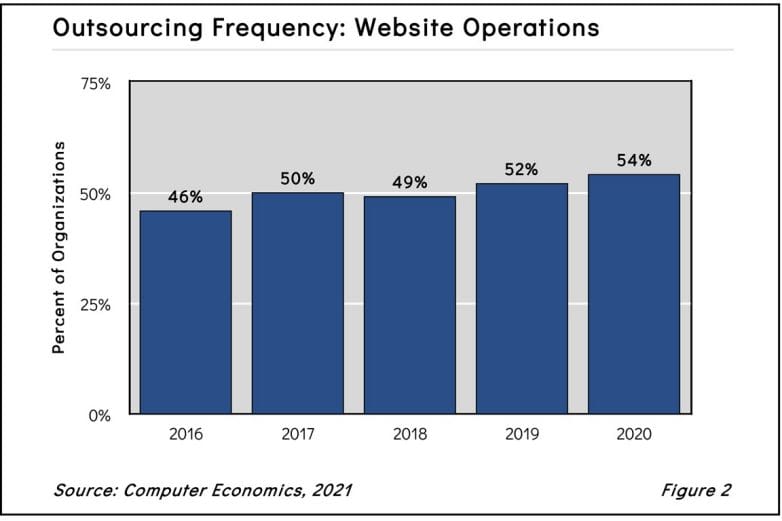Web operations outsourcing was already one of the most popular types of managed services before the pandemic. But, as we have seen with other technologies, the economic disruption is accelerating existing trends. It is clear that organizations need to continue to expand their efforts in online marketing, website management, and e-commerce. In doing so, many are turning to managed service providers that can provide the needed expertise and a flexible, scalable infrastructure to deliver highly available and reliable website and e-commerce systems.
As show in Figure 1 from our full report, Web Operations Outsourcing Trends and Customer Experience, the percentage of IT organizations that outsource at least some of their web operations rose again in 2020, hitting 54%, as shown in Figure 2. Between 2017-2019, it hovered between 50% and 52%. There is no reason to expect this trend to stop.

Web operations outsourcing is where a service provider hosts, operates, or maintains a corporate website or e-commerce system. It may also include management of e-commerce systems, such as Electronic Data Interchange (EDI) systems that are network-based but not necessarily web-based. It also can include designing and managing the website and managing web marketing operations. Moreover, the growing impact of social media has meant that online service providers must often be experts in social media marketing, as well as search engine optimization.
“E-commerce got a major shot in the arm (so to speak) during the pandemic,” said Tom Dunlap, director of research for Computer Economics, a service of Avasant Research, based in Los Angeles. “Lockdowns forced companies of all types to look for new ways to remotely engage with customers. In the space of a year, many companies had to double or triple their ability to do business electronically.”
Web operations are outsourced frequently and at a very high level. While retailers are especially likely to see this as a business-critical function and may be inclined to keep these functions in-house, some other types of companies only need basic support in this area, making web operations a good choice for outsourcing.
E-commerce has become increasingly complex as its use has boomed. Communication with customers is increasingly omnichannel, and customers expect their data and preferences to follow them across those channels. E-commerce systems must interface with customer relationship management (CRM) systems, supply chain management systems, and enterprise resource planning (ERP) to provide real-time data for managing inventory and forecasting customer demand. E-commerce systems also include the use of web application program interfaces (APIs) that allow buyer and seller systems to communicate directly. At the same time, older EDI systems continue to be deployed, and in some industries, such as automotive, wholesale distribution, and retail, they play an important role.
To help IT executives better assess their options in this always-changing landscape, our full report analyzes the percentage of organizations outsourcing web operations (frequency), the average amount of work outsourced (level), and the change to the amount of work being outsourced (net growth trend). We also present data on cost and service experience and how these trends differ by organization size and sector. We conclude with recommendations on how to engage with a web, e-commerce, or EDI service provider.
This Research Byte is a brief overview of our study, Web Operations Outsourcing Trends and Customer Experience. The full report is available at no charge subscribers, or it may be purchased by non-subscribers directly from our website (click for pricing).





